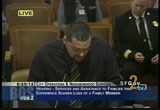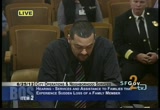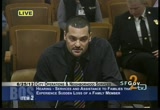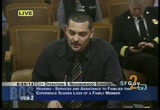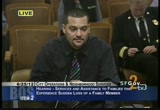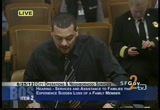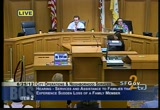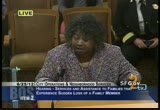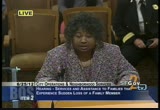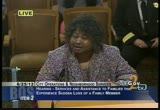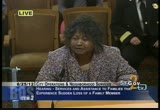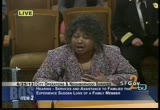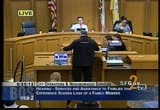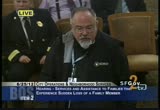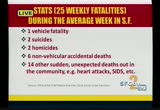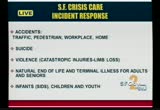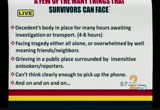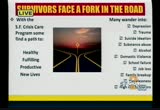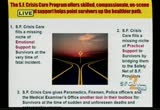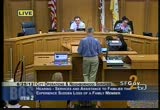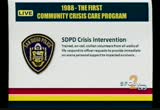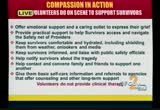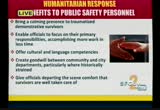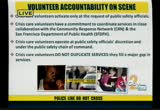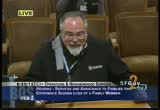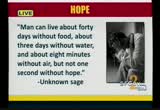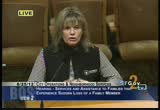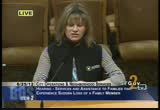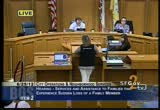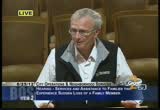tv [untitled] June 25, 2012 12:00pm-12:30pm PDT
12:00 pm
24 hours. we >> we get information from the hospital. because of our close connections. we can do it in a wholistic way and caring way that folks allow us to relay some of that information when needed. the last part is that we have family support and expedited services with the immediate systems of care. we help families advocate and navigate the victim of crime unit, navigate the system with sfpd when property, clothes, things of that nature are confiscated, we work with families to kind of work those systems and help them with the immediate aftermath of violence. the c.r.n.'s role following a homicide or violent incident is to support both hospital and crime scenes by working with the community, san francisco general hospital, sfpd and to
12:01 pm
provide answers and information to the family and community. we provide crowd control at the hospital. we help the families connect with the mortuaryy and burial service. the first responders are the ones doing the family and funeral arrangements. we have a close connection with the actual family and that request our services, we also assist in those type of services. often we are taking the families to pick out the caskets and the suit and make sure they're paid for as well. we have family support and we expedite services through the victim service unit. we coordinate healing activities such as candlelight vigils, hearing circles and organized peace rallies. we help with fundraisers and long-term effects that a family might feel. as was mentioned before, one of the biggest challenges young men that have experienced
12:02 pm
violence that have lost brothers, sisters, friends, community violence to get them into mental services and address their own ptsd so they're not a peter traitor in the months to come -- perpetrator in the months to come following the incident. we have grass roots organizations throughout the city of san francisco. we use this relationship to coordinate services with youth and families impacted by street violence and to ensure a wraparound approach to the services. this is the biggest key. when violence and hole sides hit a certain community, we can't do this alone. we work with d.p.h. and work with community-based partners to provide as much of a comprehensive wraparound approach to men and women that are impacted by violence. recreational activities, those folks already have a deep connection with these families. we really try to make sure that we tap into the folks that are best connected with the families to make sure we can
12:03 pm
expedite services and make as much impact with the services as possible. when we're dealing with families that have experienced violence or the victims of violence, we operate and try to identify the short term and long term goals based off of four impact domains. those domains are making an emotional connection, developing a report with the individual, establishing our own boundaries and making a safe space for the family and youth. the important part is a teachable moment. what we have learned is when the folks are either in the middle of either losing an individual, burying somebody that they love or if they're a survivor themselves from the actual act of violence and they're in the hospital having been admitted, we find between the first 24 to 48 hours there is a teachable moment. we can make an impact and change behavior. we can change how individual's
12:04 pm
see themselves in society and their own neighborhood and impact the decisions that mayor making within the next 72 hours. those are the keys to preventing retaliation and keep a tight lines on the individuals at risk or have the most potential in being engaged in retaliatory behavior. what we do is we gather information about the youth and their families through questioning, active listening, observations and other types of best practices in terms of communication, right, to really are figure out what is it that got this individual in this situation and how can we best impact and have that long-term. we don't somebody to say we're not going to shoot somebody in the first 72 hours, but how can we do impact and follow-up so they're in a good place a month later, six months down the line to a year. so we use this information that we have gathered to develop a description of the youth status including their strengths, their needs, their resources and their challenges. we use this information to
12:05 pm
really develop a comprehensive aftercare plan. supervisor olague: thank you. we may have questions four. some people have limited time. we wanted to hear from the circle still and from the s.f. crisis care. we may call you back up. i have questions, i was writing some down as i was listening. we worked with you before on a couple of incidents in the western addition. i definitely have questions for you. >> definitely. supervisor olague: thank you. at this time we'll hear from san francisco crisis care and, well, i guess the healing circle -- you can speak for five minutes, ma'am. you have been here since 9:00. and then we'll hear from s.f. crisis care, have comment and circle back with questions that we'll have for c.r.n. and
12:06 pm
others. >> good morning. excuse me, i'm a little dizzy. don't feel too good, but i wanted to speak on behalf of the healing circle. we will let you know that all i have heard has been really good. i myself am a survivor of four murdered children. and a lot of the resources that i have heard about today i have used and are still using. i only wish that some of the men and young women that are working with these various committees could come to me and help me a little bit more.
12:07 pm
out of 13 kids that i would have had, i have two left. four were murdered. it's not easy being the woman trying to raise more children. we need men support. we are the healing circle. we are trying to heal, but our hearts are still broken. this month i would have had two children having a birthday on the 26th and the 29th and also a baby girl came up dead in the month of june which i buried june 23, so you know it's not easy to stand before you. i also was left with a wrecked
12:08 pm
family that needed support. i had some, but i still need some more because the road is rough. george, paulette, betty, alvin, i can't call her name right now, but there are many that are trying our best to make this go forward. we even have young people trying to keep ourselves together. there are so many young people that have been lost by the way of violence and it takes a long time to heal. i just seem to break down from time to time. it's so hard and then to see my other two kids are falling
12:09 pm
apart, even though my oldest son is 45 years old, he is all around me and i really wish i could do something. i teach my children to pray and leave to the hands of the good lord because they can do more and we can't. and some of those people that have been perpetrators are walking our halls for opportunity to retaliate some more. we're not bothering me. we fight this struggle every day to live day by day. i'm sure you all know about how i feel. it's hard. i have been clammed up into a little two-bedroom house because i couldn't walk. i am just getting to a little larger place. and my boys were living, i wouldn't have to worry about
12:10 pm
your organization begging for some money to pay last month's rent and to help pay the rent. i got a little help, but i need more help right now. my landlords are asking for a little over $10,000. i don't have it. i'm hoping and prays that these organization will help me. i need more mental help in my family which is more than i can bear to try to wrestle with grown-ups. yes, i pray and i tell them about the organization that helped me. i'm used to crisis center. they come into my home. i don't mean to be too long, but they come into my home and take me to my hospital when my medication is all mixed up, when my children need help. they're young men, they're
12:11 pm
young women. they have outgrown the children department. they need adult supervision. so please if you can help me with their problems, feel free to call, 2595, saturday, we meet on thursday night. we would glad for you to come out and be in our meetings sometimes and let us all know about the various resources. we pray for you. supervisor olague: thank you. thank you for testifying and also it's encouraging to know that you actually utilize some of the services and it really helped to know that. thank you. mr. christoph from san francisco crisis care.
12:12 pm
>> can i speak from here? can he? yes. >> wonderful. let me introduce myself. i am christoph sandoval. i am the chaplain's for san francisco crisis care and a volunteer. how appropriate, how appropriate is it today that maggie stepped up here and really demonstrated human suffering to us because that is the critical question for us is how has a community, we come together to address the continuum of suffering in this city. i said earlier at the press conference, we are truly a city that is built on the premise of offering compassion and support to people in need and yet it is a tale of two cities. it's a beautiful city, and yet another part of the city has tremendous suffering. today, there two of us presenting today. i'm also the president of west side community services and the
12:13 pm
board of directors there. i'm a member of the clergy at the cathedral of st. mary of the assumption. in an interfaith group, i see maggie and i see parents and i see brothers and i see sisters and i see children coming to me for spiritual care support at st. mary's in the face of tragic loss. the darkest moment in a person's life is a loss of a loved one. and to hold that is difficult. today i would like to present you to you a special needs assessment. if you can put it on the screen, that would be great. they don't need to see me. you see my bald head in the back, good. so one of the things that we say our mission is to preserve hope in the face of tremendous loss. and the basic piece is this. we have 25 fatalities in the city and county of san francisco not related to life
12:14 pm
thening illness or terminal illness. in another carnation i was a aids activist and worked in the project, we're talking about vehicle fatalities, suicides. we do not do homicides, the public health does a tremendous job doing homicides. question provide support, but there is six nonvehicle accidental deaths and 14 others. let's break it down a little bit so you can see what i'm talking. about here here is what we actually do. we work with suicide, from suicide prevention, we refer to them. we're about there between two and eight hours working with paramedics, fire officials, police officers and of course, the medical examiner's office and at times, of course, with the department of public health. we deal with issues of violence, obviously we don't do homicide. if there are catastrophic
12:15 pm
injuries or limb loss, we can be called on based on request. natural end of life and terminal illness for adults and seniors and perhaps one that is very dramatic and difficult even for our volunteers is to deal with as i said, sudden infant death and incidents dealing with infants, children, and youth. the other thing is how does this loss affect, who in fact are the survivors? immediate family, extended family and friends, neighbors and neighborhoods, schoolmates, co-workers and unrelated witnesses. so the impact of traumatic loss ebbs out from the moment that loss takes place. some of the things that survivors can face is the decedent's body is placed for many hours awaiting transportation or transport anywhere between four to eight hours. we also face tragedy, they're all alone, are overwhelmed by
12:16 pm
well-meaning friends and neighbors, people crowd around grieving in a public place with onlookers and reporters. i tell you, i have had to back them off. i'm out on the streets, as old as i am, i'm out there marching around. people can't think clearly to pick up the phone and on and on and on. if you have had a loss in your life, you know what it feels like. you know the trout process. survivors really face a fork in the road. when san francisco crisis care program, some find a path to healthy fulfilling productive new lives because we actually act like lightning rods that help present the gift of witness and presence and we can sort of hold people. many people sort of wander off without this support into depression, trauma, suicide ideation, substance abuse, alcohol, domestic violence, school failure, job loss,
12:17 pm
family breakdown, hopeless and other high risk behaviors. without support, our coping mechanisms as human persons are demolished. if the union between two people that love each other, families and friends and significant others, this is the kind of psychic wound to the sirt and to the soul that takes place. what do we actually do? let's get down specifically? san francisco crisis care fills a missing niche of emotional support to survivors at the very time of fatal incident. now, remember, you notice they didn't say spiritual care. i didn't say mental care. i didn't say physical care. i said emotional support which means as human beings, we need a humanitarian response to these kinds of losses. we draw from all of the disciplines of experience and science and of faith. the other piece is that we, san francisco crisis care filled a missing niche of practice contact support to survivors by bridging them to the safety net
12:18 pm
of san francisco providers onsite as they happen, including to our friends here intentionally at the department of public health, the fire department, everybody, and of course the safety net of providers that are incredible in the city. you know them. you know them quite well. san francisco crisis care gives paramedics, fire officials, police officers, and medical examiner's office another tool in the toolbox for survivors at the time of sudden and unforeseen death and loss. i am going to stop there and ask david vincent who is the director to come up and finish off before i end with a last word. david. >> thank you, christoph and thank you survivors for allowing me to be here. a little bit of background on community crisis care. the first program in a major city started in san diego, it was started about 25 years oogs.
12:19 pm
it was a pilot program that was launched by a group of police officers in partnership with the community and their thought goes back to that fork in the road that christoph mention aid few mention ago. they would go out on these scenes of a heart attack or respiratory failure or whatever and see if there was no one there for the survivors. they piloted this program. it was successful very quickly. in 25 years, you see the orange county intervention program in partnership with muni palts with los angeles county, riverside crisis program, sacramento, portland, seattle, las vegas, phoenix, but there giant gap here on the west coast and that is here in the bay area. so a couple of years ago, we began assembling a coalition here in san francisco to start a model program for the bay area. essentially, as christoph mentioned, the way the crisis
12:20 pm
care program works is that we have col untears from all walks of life who are trained and available on call to respond to questions from police, fire, medical examiner officials to go to the scene immediately and the volunteers are there on scene with the survivors of the trauma. the majority we go to are natural events, cardiac events, respiratory events, also suicides, second biggest ones, accidents, unintentional overdoses, falls, drownings, things like that. the volunteer on scene offer a number of very basic practical services. they are not clinicians for the most part and to the extent they are, they don't act in a clinician's role. they're there just to provide a neighbor to neighbor, human to
12:21 pm
human compassion for support. they give the person a place to express their grief. they help the survivors what is happening, what is happening next, what is happening in a day. they help make phone calls. they explain who the various public safety officials are. they can notify other family members of what is going on. they give them basic information on how to care for themselves, how to care for one another and give them referrals to other agencies as christoph mentioned. it offers a number of benefits for public safety personnel and to the city at large. it brings a calming presence, even for a natural death, if you're just a grandma dying of a heart attack, next to grandpa and the grandchildren can be a very high intensity incident and we bring the stress level do you. it brings good will between the city and the community, between the officials and the fire
12:22 pm
department and local communities. it gives officials comfort that once they leave the scene and go back on patrol or back to the firehouse that somebody is taking care of that family. >> i'm not going to go through all of this. we have a lot of speakers to come up and talk. the one point i wanted to bring up, we have given the city a draft memorandum of agreement to formalize our relationship here. our volunteers, a number of whom are in the audience here that hopefully you'll hear from today, we have now responded to a want to say 34 activations, primary from the fire department, although a few from the police department and medical examiner as well and there is much more opportunity to get out there, i can assure you, but we can't do that. we're kind of limited in a number of operational ways until we get that memorandum of agreement in place. the city's attorney office, katie porter has reviewed it. she had a couple of comments and recommendations which we have made an incorporated to
12:23 pm
meet those questions that she had. we now, we basically need the chiefs andth director to sign it. ideally, we would like to get dr. hart to sign it as well, the chief medical examiner. that would be a good fourth signature if that is possible. that is essentially where we stand right now. we would love to have, actually, we already do have san francisco as a model for the rest of the bay area. we would like to take the fabulous volunteers you have here and start working in san mateo county, alameda counties and the others as well. i want to be conscious of the time. if you have any questions, i would be happy to answer them. supervisor olague: none at this time. thank you, though. >> let me end with a quote and then an ask. most of you know that volunteer organizations provide a great deal of value to focus. at the site of my work, we have 1,500 volunteers in the
12:24 pm
streets, tremendous agents of the city. the same is true for here. as we learn those lessons from that epidemic to step up and to do this kind of work is critical. we do require some emergency seed money which i think the board knows that i have asked for on behalf of the agency and on behalf of the citizens of san francisco. this is a very tough time in the city and county of san francisco. we know it. we need it and so you know what we're asking for and we just want to say that to you. at the same time i want to go back to the human piece. because our whole theme is hope. here is an interesting quotation. men can live about 40 days without food, about three days without water and about eight minutes without air, but not one second without hope. and i say this to you because as i take people to -- i do funerals. i go to the mortuaries, i comfort people there to end. i support people during their life transition experience at the bedside. i have to tell you that the
12:25 pm
greatest gift that we can give them is the gift of these volunteers. the strength for the journey is each other. the one lesson i learned in the aides epidemic and i learned by doing the work in the streets, love really is the question and love really is the answer. thank you for allowing me to be a clergyperson. supervisor olague: thank you. i would like to open it up for public comment at this time. members of the public that would like to speak, you can line up over here or you can, whatever is easier for you. >> hi, i'm a crisis response volunteer, one of the crisis care volunteers and have had the tornado of going on many of the calls that we have had since the beginning. i want to give you a flavor for them. we have talked about the logistics but what it's like to be there. when i get called usually by the fire department of who we have a good relationship, i
12:26 pm
arrive there, meet a partner and stepping in knowing very little about what has actually happened. all i know, a suicide, a death of a child, the death of an adult or whatever. we have been prepared to groups. i have been in the home of a russian family, of a burmese family, of an indian family, of a african-american family. it is a challenge to speak their language, their emotional language and how to be emotional support to them. i will speak a little bit about one of the responses that i did which actually in the newspapers. i don't think i'm confidentality. it was a suicide two weeks ago admission to do loriest children. the caretaker of the church who is of indian descent usually starts his day asking the homeless to sleep there to leave the space. there was a man lying there and he had blood on his hand and on
12:27 pm
his face. he came up to him and said do you need a doctor? and the man barely responded, so he called 911 and when he come back, he saw that the man had a gun pointing to his temp and said, no, please, please don't do anything. we can help you. instead the man shot himself right in front of him. i was called by the fire department and showed up on the scene within 20 minutes of the incident, so really soon after. i was able to take the man to a private room within the church, in an office and actually speak to him. i had the time and the luxury for being with him for three hours. i think those three hours were crucial. it really is within that fish phase that offers the most people and help people so they are not spiraling down into serious mental health problems. supervisor olague: thank you for your work. there is an initial warning and
12:28 pm
a big bell. >> i was lucky to meet this man in the street two weeks later and he was so enthusiastic how he was able to survive that incident by having that initial response. i wanted to let you know we do help people. thank you. >> i'm dan rosen, a retired city employee and also a clergy person at times. supervisors elsbernd knows. i want to relate one call. i have been to a couple suicides, i have been to a drowning and a number of natural deaths. d.p.h. has their hands full with the other violence and homicides. can you imagine you're having a picnic with your dad on sunday. you go to work on monday expecting everything to be fine and you receive a call going to your dad's home. your dad has died by a heart attack during the night.
12:29 pm
totally unexpected. you arrive home, an elderly aunt lives with the dad who has a touch of dementia and doesn't understand what is going on. paramedics extend their condolences. the medical examiner determines it's a natural death and the job is done. the daughter is left now to care for the aunt and her dad. i don't know what to do. i have never experienced this. what are my next steps? who do i call? as a crisis care responder, we're there to offer that emotional support to help her through the emotions of it, the shock, the trauma, and also to help her get her own resources together and to help her engage a funeral home, to help with the great aunt, to get her belongings together, to help her pack the car, to wait for the funeral home to come. we're there to comfort her. do you want to see them take the body out?
75 Views
IN COLLECTIONS
SFGTV2: San Francisco Government Television Television Archive
Television Archive  Television Archive News Search Service
Television Archive News Search Service 
Uploaded by TV Archive on

 Live Music Archive
Live Music Archive Librivox Free Audio
Librivox Free Audio Metropolitan Museum
Metropolitan Museum Cleveland Museum of Art
Cleveland Museum of Art Internet Arcade
Internet Arcade Console Living Room
Console Living Room Books to Borrow
Books to Borrow Open Library
Open Library TV News
TV News Understanding 9/11
Understanding 9/11